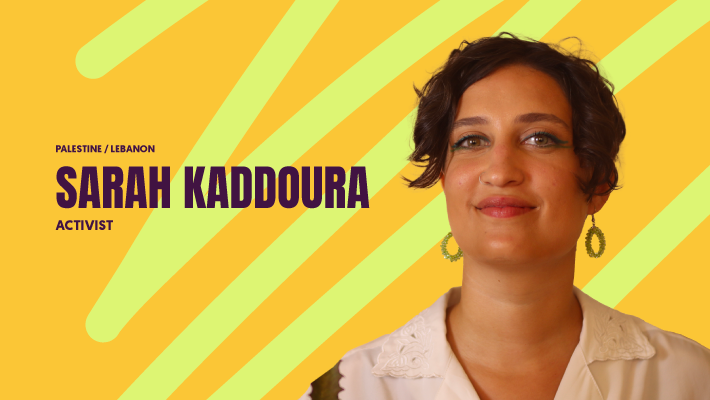Sarah Kaddoura
ACTIVIST
PALESTINE / LEBANON

Saadia Batool (she/her) is a visual artist from Pakistan. She graduated with a distinction in Fine Arts from the National College of Art Lahore in 2022, majoring in Painting. She has exhibited her work in the Young Artists Exhibition at Alhamra Lahore in 2019 and 2020. She has showcased her work in a group show at Tagheer Art Gallery, Lahore. She was part of a group show “Asli Contemprorary” at Numaish Gah, Lahore. She also was part of a four-person show “Fine China” at Artescape Gallery Islamabad. She exhibited in the show “Broadcast Volume 1” art O Art Space, Lahore. She was part of the show “In the realm of madness” at Gallery Full Circle Karachi. She exhibited in a group show at 8B2 Gallery Islamabad in January. Batool was part of a Inception Grant show 2024 and exhibited at Triveni Kala Sangam New Dehli, India. A rich library of Sara’s work is available on her YouTube channel and she can be followed on instagram.
Growing up as a Palestinian refugee, I learned quite young that the ways one contributes to the liberation of their people can take different forms, including writing and picture, comics and theatre, etc. Not only were these forms of art produced to critique and resist oppression, but to also keep a heritage that was pushed into erasure, alive and well.Sarah Kaddoura
What role do you think art can play in social change?
Growing up as a Palestinian refugee, I learned quite young that the ways one contributes to the liberation of their people can take different forms, including writing and picture, comics and theatre. Not only were these forms of art produced to critique and resist oppression, but to also keep a heritage that was pushed into erasure alive and well. This art includes the songs my grandmothers still recite from memory since they were 7 years old, and the handwoven thobe dress full of tatreez stitches that my mother wears daily. In not-so-subtle ways, symbols of community and survival persist through those artistic mediums. Art, even when it’s not an easy process, is still one of the easiest ways to communicate solidarity and community, and to disguise dangerous ideas of resistance to oppression, while also bringing about collective catharsis.
How would you describe your artistic practice as a feminist activist, researcher, and content creator based in Lebanon?
Writing is my favorite medium of expression, and storytelling is the fun one! But I am also not inventing the wheel through the work I do. The inspiration behind the channel is a combination of the endless intriguing discussions I have been part of as a participant or a witness, the engaging cultural products and debates online and in-person, and the heartwarming and heart wrenching encounters with patriarchal capitalism. The videos are an attempt at engaging with all of these and extend an invitation for viewers to do the same and take with them what they will into their personal lives and political movements. The work is focused on cultural and political productions from around the world but mainly from the Global South, especially the SWANA region. These videos, at the end of the day, are made in the hope of contributing to collective feminist consciousness raising. Some of the incidents that make me feel that this work is worth the effort and feels purposeful is when people tell me they shared a video with their mother, or used a video in a workshop or discussion with a group they are part of.
What do you hope to achieve through this award?
I want to create and experiment with long form videos that require a lot of time and labor. Such videos would also allow for more artistic freedom in terms of writing and performance, and give space for better molded discourse and depth. This award allows me to dedicate time to these videos for several months.
Featured work
Introduction to Ecofeminism: This video explains the concept of ecofeminism and serves as an introduction to an upcoming series on ecology, women, extractionism and capitalism.
The witch hunts: This video gives a historical overview on the witch hunts that took place in Europe and the US, and its relationship with healing, policing of sexuality, reproductive health, and peasant revolutions.
